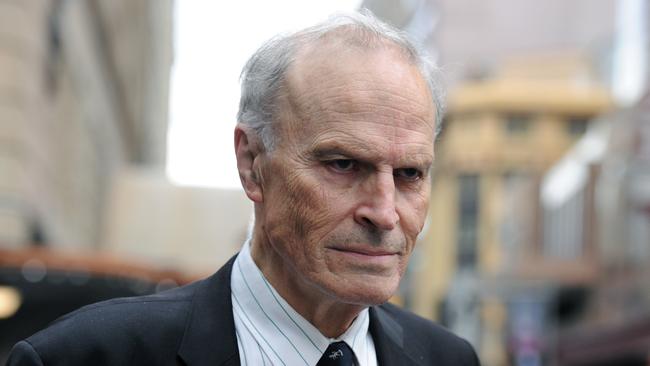Rush to condemn endangers the presumption of innocence
When I was a young lawyer at a big Sydney law firm, sexual harassment was something we were left to work out ourselves.

There is no question that, decades ago, when I was a young lawyer at a big Sydney law firm, there were no real processes in place to deal with sexual harassment. Mostly it was left to us to work out, and some women gave as good as they got. Word tended to get around about the creeps to avoid — or, if that was your poison, who to seek out. But even in a large firm it was only ever a handful of men who were known for their leers, jeers and sleaze.
There is no excuse for what went on in the late 1980s and 90s, but it was a different time. Law firms, like many other workplaces, were far less bureaucratic in many areas, not just managing the behaviour of their staff.
In the #MeToo era, and our rush to find a sensible system to deal with sexual harassment in the workplace, it is worth considering whether we are tossing aside old principles without putting something better in place.
This burgeoning new frontier of sexual harassment raises an unresolved and tricky intersection between criminal law and administrative processes where clear principles that apply in criminal proceedings don’t necessarily apply here. That a person is presumed innocent until proven guilty and that guilt must be established beyond reasonable doubt following a fair trial at which the accused is accorded natural justice are still accepted as foundation principles of criminal law. Since William Blackstone’s famous commentaries in the 1760s, we have accepted that in criminal matters it is better that 10 guilty people escape punishment rather than one innocent person suffer.
In administrative matters and the like, dealing with workplace codes of conduct and laws that are civil, rather than criminal, we have moved away from those principles. For example, the burden of proof is now lower, and when we move to a balance of probabilities we accept a rougher form of justice because some decisions will be a borderline call.
Depending on the nature of the claim and the kinds of consequences that flow from finding someone guilty, it can make sense for employers to err on the side of accepting there has been harassment in unclear cases. If it simply means moving people into different areas of a workplace, we can live with the rougher justice.
But if a guilty finding against an alleged harasser means more serious consequences — imposing big financial penalties, say, or worse, ending a career and ruining a reputation — what kind of lesser form of justice is fair? Surely, some principles should always apply: a minimum level of natural justice; a presumption of innocence and finality around a decision taken, absent any new evidence emerging, to avoid the injustice of double jeopardy. And if parties agree, with the benefit of legal advice, to conciliate or settle a complaint confidentially, it should surely stay confidential unless and until both parties agree otherwise.
Sadly, there is no agreement on this. The starting point for many is that old principles favouring the protection of the innocent above the desire to punish the guilty should not apply to sexual harassment. But because they haven’t offered a consistent, defensible and fair replacement for those principles, the results have been wicked.
Last year, the Supreme Court of Queensland ordered the University of Queensland to stop an internal hearing into an allegation that a final-year medical student had sexually assaulted a fellow student. The alleged perpetrator was due to sit his final exams in November and begin an internship at a hospital this year. He faced expulsion if found guilty by the university’s administrative process.
The court held that “it would indeed be a startling result if a committee comprised of academics and students who are not required to have any legal training could decide allegations of a most serious kind without the protections of the criminal law”.
It was a sound decision. But the tide is still turning against basic protections. Collingwood’s Jordan De Goey has been charged with indecent assault. Writing in The Australian last week, Jessica Halloran said: “De Goey is entitled to the presumption of innocence but that does not translate into the right to play (footy) while the charges are being dealt with by the judicial system.”
What then does the presumption of innocence mean, if not that? We might rue the day when the presumption of innocence is routinely dismantled for more of us too.
Lawyers who work in this fraught area admit that systems in place today to deal with sexual harassment favour those making claims and can punish the innocent. But we rarely hear about these because in “she said vs he said” cases many companies would rather pay private “hush money” to protect their reputations from public claims they might harbour sexual harassers. That is preferable to undertaking impossible investigations to find an unknowable truth.
Politicians aren’t great role models for upholding established principles that it is better that 10 guilty people go unpunished than it is to punish the innocent. In NSW, the courts are prevented by law from allowing an accused person from bringing evidence of prior false sexual assault complaints by a victim. A week ago, the NSW Court of Appeal threw out an appeal by a man known as Jackmain who has been accused of sexually assaulting a woman. He has been prevented from bringing evidence at his trial of 12 occasions when the complainant made false sexual assault claims, and in some instances she admitted she had fabricated the claims. The NSW government has known of this legal injustice for some time, but has done nothing.
Principles aimed at protecting the innocent from punishment took another battering when, last month, the Chief Justice of the High Court announced the court “believed” six women after an external investigation found the former associates had been sexually harassed by former High Court judge Dyson Heydon.
Susan Kiefel was in an invidious position. As the first female leader of the court, the pressure on her to do more than previous leaders had done was enormous. Her empathy for the women is admirable. The need for an investigation was obvious. The findings deserved to be made public.
It may have been more prudent for the Chief Justice of the nation’s highest court to say: “We regret that the High Court did not have formal processes in place to deal with claims of sexual harassment. We will rectify that. In the meantime, here is the external investigation. The court has sent it to the Attorney-General and to the police for their consideration. We will not comment further because we are in the unique, and difficult, position that any comment from the High Court could prejudice a proceeding that comes before us at a later stage. Any comment we make may also influence a lower court called on to sit in judgment of hear any of these findings.”
Another recent example of the pressure on established principles of fairness occurred with AMP this week. In 2017, the boards of AMP Limited and its subsidiary AMP Capital, each chaired by a woman and with a number of female directors, oversaw the process whereby Boe Pahari was disciplined for “low level” breaches of the company’s code of conduct. The AMP board thought the punishment administered was ample, indeed strict, and allowed Pahari to return to work. When considering his promotion to chief executive of AMP Capital a few weeks ago, the new board at AMP decided that the 2017 process was sufficiently rigorous, that it would not impose a second penalty on him for the same offence.
Yet there is a raging debate, including among AMP investors, who say they are under pressure to complain because “community standards” have changed since 2017. But this means double jeopardy is fine if the current fads say it is. It means no penalty is ever final because tomorrow’s mob might recontest the punishment. It implies even some low-level offences cannot be forgiven and offenders can never be rehabilitated.
There is no perfect process when it comes to dealing with sexual harassment and similar offences in the workplace. We surely needed something to fill the vacuum in early decades that allowed some perpetrators to escape penalty. But we should be careful that we haven’t filled a vacuum with unfair rules and mob rule. That is not a sign of progress.



